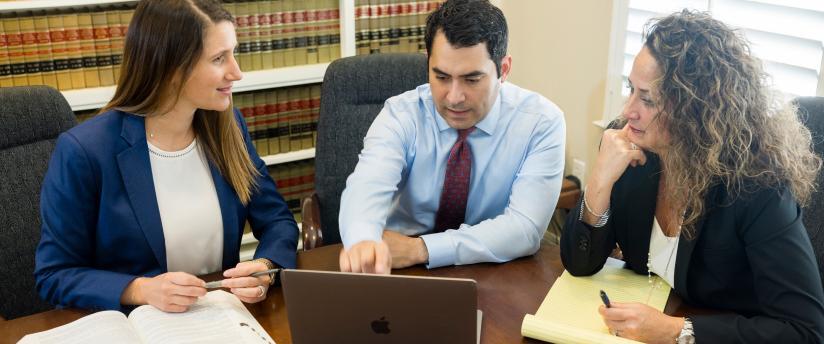Am I Being Investigated for a White Collar Crime?

Various federal agencies investigate white collar crimes, including:
- Internal Revenue Service (IRS)
- U.S. Treasury
- Federal Bureau of Investigation (FBI)
- U.S. Securities and Exchange Commission (SEC)
Investigations into white collar offenses can be complex and time-consuming due to the involvement of multiple agencies.
These agencies might even order an investigation into an alleged criminal offense even if you are not the suspect.
You have a legal obligation to cooperate with a government investigation into a white collar crime that involves your company. However, it’s vital to avoid self-incrimination. You should respond to the agencies promptly and honestly but have your lawyer with you..
What Is Considered a White Collar Crime?
A white collar crime is a non-violent crime a person commits for financial gain. Money is the primary motivating factor in white collar offenses. The perpetrator wants to either obtain or avoid losing assets or property, whether in a professional or personal capacity.
At Minton, Bassett, Flores & Carsey, P.C., our white collar crimes defense team defends clients against a range of white collar crimes, such as these.
Embezzlement
Embezzlement is a type of theft typically committed by an employee of a company. Embezzlement doesn’t fall under a specific statute. However, it refers to appropriating someone’s property with the intent to deprive or defraud.
Perjury
According to Texas Penal Code § 37.02, someone commits perjury if they intend to deceive and knows the statement’s meaning when they:
- Make a false statement under oath or swear to the false statement’s truth, and the statement must be made under oath as required or authorized by law; or
- Make a false unsworn declaration by the rules of Chapter 132 of the Texas Civil Practice and Remedies code.
Fraud
Fraud is a general crime category involving a range of illegal actions. By definition, fraud is the omission or false representation of a material fact by conduct or words with the intent of satisfying a financial or personal gain. Mail fraud, credit card fraud, healthcare fraud, and insurance fraud are among the most common types.
Money Laundering
Texas Penal Code § 34.02 defines money laundering as knowingly:
- Maintaining an interest in, acquiring, transferring, possessing, transporting, or concealing a criminal activity’s proceeds.
- Supervising, conducting, or facilitating a transaction involving a criminal activity’s proceeds.
- Expending, offering, investing, or receiving the funds of criminal activity or proceeds the person believed to be from a criminal activity.
- Investing, financing, or intending to invest or finance funds believed to be for furthering a criminal activity.
Larceny
Larceny is another word for theft. It involves taking someone else’s property without authorization and intending to deprive the owner of it.
Wire Fraud
Wire fraud occurs when a person uses interstate wires (i.e., any form of electronic communication) as part of a scheme to defraud someone else out of their property or money. Four elements of wire fraud must exist for the prosecutor to convict the defendant:
- The defendant had a scheme to defraud another person;
- The scheme involved material misrepresentation of the truth or deception;
- The defendant intended to defraud the victim of their property, honest services, or money; and
- The crime involved using wires across state lines. However, the defendant does not have to know about the involvement of interstate wires.
Mail Fraud
Mail fraud is similar to wire fraud. The only difference is the method used to commit the fraud. It is a federal offense involving using mail to defraud another person out of their honest services, money, or property.
Bankruptcy Fraud
Filing for bankruptcy is a solution many people turn to when facing debt that they can’t afford to pay. Bankruptcy fraud involves fraudulent actions taken while claiming bankruptcy, such as:
- Providing false information on bankruptcy forms
- Failing to disclose certain assets
- Filing for bankruptcy in more than one jurisdiction
- Using a false name on the petition
- Withholding required documentation
- Knowingly making false statements during a 341 creditors’ meeting
Forgery
According to Texas Penal Code § 32.21, forgery occurs when a person forges any writing with an intent to harm or defraud someone else.
The offense is typically a Class A misdemeanor. Penalties include up to a $4,000 fine and no more than one year in jail. However, the charge increases to a felony if the forged writing involves a(n):
- Mortgage
- Will or supplement to a will
- Deed
- Deed of trust
- Security agreement
- Security instrument
- Authorization to debit an account at a financial institution
- Check
- Credit card
- Order for payment of contract, release, money, or another commercial instrument
Credit Card Fraud
Credit card fraud is a type of identity theft under state and federal law. Examples of this criminal offense include:
- Opening a new account with a stolen credit card
- Stealing someone’s credit card number to make online purchases
- Knowingly using a revoked or expired credit card
- Using a counterfeit credit card
Counterfeiting
Counterfeiting commonly involves money. People often print fake money to use for various purposes. The offense at the lowest level is a misdemeanor.
However, counterfeiting becomes a felony when it involves an attempt to obtain services or property. Someone found guilty of counterfeiting could face penalties at the state level and federal sentencing.
RICO Claims
The Racketeer Influenced and Corrupt Organizations Act (RICO) is a federal law to make criminal organizations illegal and provide prosecutors with a method for approaching groups of businesses or individuals involved in various types of crime.
According to 18 U.S.C. § 1962, it is illegal for a person:
- With direct or indirect income received from a pattern of racketeering or through the collection of an unlawful debt, to indirectly or directly invest or use the income or proceeds of the income in establishing, operating, or acquiring an interest in any enterprise that participates in or whose activities affect foreign or interstate commerce;
- Through the collection of unlawful debt or a pattern of racketeering activity, to directly or indirectly maintain any interest in or control of or acquire an enterprise that engages in activities that affect interstate or foreign commerce; or
- Employed by or associated with an enterprise that engages in activities affecting foreign or interstate commerce to participate in or conduct the enterprise’s affairs through racketeering activity or the collection of unlawful debt.
Extortion
Extortion occurs when someone demands property or money by threatening physical violence, damage to reputation, damage to property, or unlawful action against the government. A threat must exist to bring an extortion charge against a person.
Bribery, Including of the Government or Law Enforcement
In Texas, receiving or offering money or another type of benefit is illegal in exchange for a judicial decision, political vote, or another official decision. Bribery can become a federal charge if it involves a government official or member of law enforcement.
Tax Evasion and Tax Fraud
Tax evasion is a form of tax fraud. These offenses can involve violations of state tax codes or federal tax codes.
Common types of tax fraud include:
- Failing to pay to the comptroller a tax amount collected
- Making a false entry in maintained tax records
- Attempting to defeat or evade an imposed tax
- Using an exemption certificate despite knowing it contains false information
Environmental Crimes
Environmental crimes are illegal acts that directly harm the environment and humans. Common types of environmental crimes include:
- Illegal, unreported, and unregulated fishing
- Wildlife trade
- Illicit trading in hazardous waste and pollution
- Illegal logging and trade in stolen timber
- Illegal mining
- Smuggling ozone-depleting substances
Computer Fraud
Computer fraud involves using a computer, the internet, or an internet service or device to defraud individuals or organizations of their resources. Computer crimes often include activities such as phishing and viruses. It’s also a crime to knowingly and intentionally access someone’s network, system, or computer without their consent.
Identity Theft
Texas Penal Code § 32.51 refers to identity theft as fraudulent use or possession of identifying information. A person commits identity theft if they intend to defraud or harm another and possess, transfer, obtain, or use an item:
- Of another person’s identifying information without their consent or effective consent;
- Containing information of a deceased natural person, including a fetus or stillborn infant, that would count as identifying information if that person were alive, if someone transfers, obtains, uses, or possesses the information without legal authorization; or
- Of identifying information of a child under 18 years old.
Insurance Fraud
Insurance fraud is the act of filing a statement containing misleading or false information to an insurance company to deceive or defraud the insurance company. Someone commits this offense if they lie to their insurer to receive a payout.
Deceptive Business Practices
Claims made under the Deceptive Trade Practices Act can involve circumstances such as:
- False and misleading information
- Misrepresentation of a product or services
- Warranty disputes
- Breach of contract
- Bait-and-switch tactics
Welfare Fraud
Like other types of fraud, welfare fraud refers to using deceptive acts, misrepresenting information, or falsifying documents to obtain public assistance benefits.
Multiple federal government programs could be the target of fraudulent activity, including:
- Temporary Assistance for Needy Families (TANF)
- Supplemental Nutrition Assistance Program (SNAP)
- Children’s Health Insurance Program (CHIP)
Get Help from Our Austin White Collar Crime Lawyers
A white collar crime conviction can be devastating. It can interfere with your life and completely take away your freedom.
At Minton, Bassett, Flores & Carsey, P.C., we work hard for our clients after an arrest. We will stay by your side, fighting for your reputation, livelihood, and future.
If you face charges for a white collar crime, call us today for your confidential consultation with a knowledgeable and aggressive Austin white collar crime attorney.







